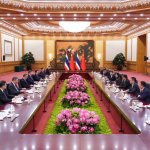
This May, voters in the Philippines will elect the son of a notorious dictator. Ferdinand Marcos, Jr., or “Bongbong”, is the top candidate to replace Rodrigo Duterte as President. Polls show the younger Marcos with a healthy lead over his opponent, the incumbent Vice President Leni Robredo. The result could see the return of a political dynasty famous for its corruption and a penchant for abuse of power. The May 9 election results could have deep implications for Thailand and broader southeast Asia.
For the Philippines, like other parts of east and southeast Asia, the most problematic leaders often arrive as potential saviors. In the 1960s, frustration with the political ruling class brought Marcos to power in the Philippines. Promises to intensify public works projects, boost agricultural yields, tackle growing income inequality, and bring law and order to society gave him instant legitimacy. Similar problems, including a perceived lack of progress coming to terms with drugs and crime brought Duterte to power five years ago, and like Marcos before him, brought disastrous results.

Marcos, when faced with charges of corruption and twin challenges to his power in the form of the New People’s Army (NPA) and the formation of the Moro National Liberation Front, announced a proclamation that gave him control of the military, the power to abolish freedom of speech, a free press, and other civil liberties. Marcos even ordered the arrest of his political opponents. Duterte’s brutal war on drugs has had far reaching consequences.
There is an even worse byproduct of regimes like Marcos and Duterte. Their authoritarian tendencies have been heralded by a wide swath of the electorate. Duterte’s war on drugs has been extremely popular. Marcos remains popular, despite a campaign to topple him in 1986. Thai people can surely relate. In the 2019 election, more than 8.4 million Thais voted for Palang Pracharath candidate and 2014 coup leader Prayut Chan-o-cha—and when combined with results from more conservative parties gave the coup leader enough support to retain his position as Prime Minister, although significant manipulation of the election and a Constitution written by the military gave him a boost Marcos, Jr. could only dream of.
A romanticism about the past also comes with a whitewashing. According to the Human Rights Violations Victims’ Memorial Commission of the Philippines (HRVVMC), 11,103 people were victims of the Marcos regime, while Amnesty International recorded more than 100,000 victims—tortured, imprisoned, or killed. During the Duterte era, as many as 20,000 were victims of his war on drugs. These deaths, however, take a backseat to a reverence for the Marcos era, where infrastructure improvements and public works projects are offered as testament of the development of the country. Marcos, Jr. whitewashes the past in order to persuade a younger generation of Filipinos, largely unfamiliar with the horrors of the past. In the same way, a romanticism about the era of Thaksin Shinawatra, evidenced by the implementation of the 30-baht health care scheme and other populist policies trample the horrors of his brutal campaign in Thailand’s Southern Provinces.
A victory for Marcos, Jr. would also be a setback for Southeast Asia and create extreme difficulties for countries competing with China. Bongbong has publicly stated that he will move the country closer to Beijing, while China in return expects Marcos Jr. to abandon a 2016 ruling that rejected China’s territorial claims in the South China Sea. The ruling by the Arbitral Tribunal found in favor of the Philippines, recognizing its sovereign rights within its own Exclusive Economic Zone (EEZ).
Since that time, China has repeatedly threatened the area with incursions by coast guard ships, militia vessels, and fishing boats. Like many countries who maintain closer ties to China, there is an expectation that they are expected to fall in line on other issues of international importance as well. Thailand can ill afford to get further entangled in disputes in the South China Sea, as in the past it has played a role as a mediator. ASEAN is already divided on the subject, as Brunei, Malaysia and Vietnam still have disputes with Beijing over the 3.5 million kilometer waterway.
Marcos, Jr’s election will also signify the resilience of a culture of impunity that has swept the region. Because of his deep connection to his father and political ties to the outgoing Duterte, it is likely that he will retain many of his brutal policies, including his war on drugs. With populism, results—not process—matters most. Those who patiently wait for the rule of law and due process are derided as soft on crime and often draw the ire of the public. Bongbong is also willing to prevent investigations of Duterte’s war by international investigators like the International Criminal Court.
The rise of the eldest son of Ferdinand Marcos can also be attributed to a declining collective memory of the past. Elections are supposed to have consequences. While the current situation in the Philippines is the result of collusion by dynastic Filipino families, citizens should also remind themselves of how voters of the past ended Marcos’ reign once and for all. While Corazon Acquino was declared the winner of the 1986 election by the National Movement for Free Elections (NAMFREL), the official tally put Marcos ahead, which resulted in walkouts in Parliament and the mobilization of more than two million people who took to the streets. As public support for the Marcos regime slipped, so too did his grip on power. Bongbong’s election is a reminder of how quickly the public has forgotten about how to deal with autocrats of the past. Will history repeat itself?






